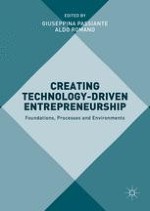2016 | OriginalPaper | Chapter
2. The Technology-Driven Entrepreneurship in the Knowledge Economy
Authors : Aldo Romano, Giuseppina Passiante, Pasquale Del Vecchio
Published in: Creating Technology-Driven Entrepreneurship
Publisher: Palgrave Macmillan UK
Activate our intelligent search to find suitable subject content or patents.
Select sections of text to find matching patents with Artificial Intelligence. powered by
Select sections of text to find additional relevant content using AI-assisted search. powered by
